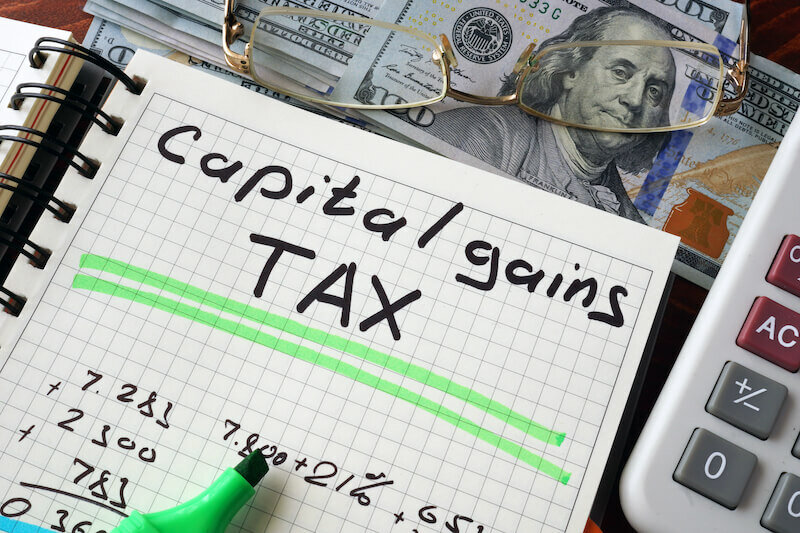Before you start doing all your research on how to sell your house or ways to stage your home in Texas, you probably should find out if you’re going to need to pay capital gains taxes. Hearing the word taxes instantly makes you think of money either being paid to the IRS or getting a tax return back, but in this case, you may owe capital gains taxes on your real estate. If you’re not familiar with Texas’s capital gains tax or how much capital gains tax in Texas is, you’re not alone. Lucky, you came to the right place to find out all you need to know about Texas capital gains taxes and how much the capital gains tax in Texas cost. To find out if you will need to pay capital gains on the sale of your Texas property, continue reading for more information.
What You Should Know About Capital Gains Tax

What Are Capital Gains?
A capital gain is a profit you make upon the sale of a capital asset. A capital asset is a house, car, land, investment property, stocks, bonds, even art, or collectibles. When any of those items are sold for more than the original purchase price, the profit is considered a capital gain. For example, if you purchased a home in Houston, Texas, ten years ago, for $250,000 and decided to move and sell the house for $600,000, you made a profit or capital gain of $350,000. $350,000 is subject to the capital gain tax in Texas and how much you will need to pay is determined by a couple of factors.
- How long you have owned the capital asset
- How long you’ve lived in the house
- How much income you make
- How you file your taxes
- If any exceptions apply to you
Now you’re probably wondering how much is capital gains tax in Texas? Let’s take a look at these a little bit closer to have a better answer.
How Much Do You Pay on Capital Gains Tax Texas?
Before you panic, the IRS does let you exclude $250,000 of capital gains for an individual tax filer and $500,000 of capital gains if you file joint tax returns or are married. So if we use our example above and say you filed individually, applying the exclusion of $250,000 can reduce the capital gain amount. The math looks like this: $350,000-$250,000= $100,000, $100,000 is that you would potentially owe capital gains taxes on.
Other Factors that Affect Capital Gains Tax Texas
There are a few ways your exclusion of $250,000 or $500,00 could be affected, resulting in you owing taxes on the full capital gain amount. Here are a few ways you wouldn’t be able to use the IRS exclusion.
- The property wasn’t your primary residence.
- You were the homeowner for less than two years in five years before selling your home.
- You didn’t live in the home for two years in the five years of ownership.
- You’ve already claimed the exclusion of $250,00 or $500,000 on another house within two years of selling this residence.
- You purchased the home with a 1031 exchange or a like-kind exchange. Swapping one investment property for another within the last five years.
- You are subject to expatriate tax.
Once you go over the exclusions and determine that you do owe capital gains taxes in Texas you will need to figure out your tax bracket. This will let you know what percent rate applies to your capital gains.
Long and Short Term Gains
The rate you’ll pay on your capital gains will fall into one of two categories.
- Long Term Capital Gains
- Short Term Capital Gains
The capital gains taxes you owe will depend on how long you have owned the asset (your home). To get more favorable tax rates, you will need to have owned the house for more than a year to be considered a Long Term Gain. If you have owned your property for less than a year and sell, you fall into the short-term gain category, taxed at a higher rate.
The long-term capital gains tax, the tax brackets are 0%, 15%, and 20%, and for short-term capital gains, the ordinary income tax rate applies.
Something to keep in mind, capital gains on a house are not owed until you sell the property. So while you own the home and the value increases, you do not owe taxes on the gains until you sell.
How to Avoid Capital Gains Tax Texas
When it comes to selling your house, there are three ways you can avoid capital gains tax or at least get the amount owed reduced.
- Live in the house for at least two years before selling. They do not have to be two consecutive years. Capital gains tax in Texas applies if you haven’t lived in the house for at least two years before selling. If you were to sell in less than two years, your capital gains would be considered a short term capital gain and have a higher tax rate than a long-term capital gain.
- Figure out if you qualify for an exception. Examples of exceptions would be if you sold the property because of health, work, or “an unforeseeable event,” according to the IRS. For more details, check IRS Publication 523.
- Do Home Repairs. Home renovations can be deducted from your capital gains tax. Make sure to keep all the receipts for any repairs, upgrades, or renovations.
Conclusion:
Paying taxes is never fun, especially when you’re already dealing with selling a house. Besides paying taxes, you may be on the hook for expensive home repairs, realtor commissions, and other hidden costs and fees. For some people facing bankruptcy, foreclosure, divorce, or just financial strain, the money isn’t readily available to cover all the extra expenses involved in selling.

There is Another Solution…..
Sell your property to a local homebuyer in the Houston area. What is a local home buyer you may be wondering? Homebuyers are either a single investor or a small group of investors that purchase real estate for either resale or to keep as a rental property. Some of the advantages of working with a homebuyer would include:
- Homebuyers close in a shorter time frame than traditional buyers
It takes traditional buyers to close anywhere from 30-60 days. For a homebuyer closing can take as little as seven days in some cases.
- Homebuyers pay in cash, which allows them to close quickly since they aren’t waiting for bank financing and other contingencies. Traditional buyers using a bank to purchase a home must pass several contingencies before getting approved.
- Homebuyers buy houses in as-is condition, which saves you time and money, not to mention the hassle of doing renovations. Prospective buyers are usually looking for a turn-key property, and a lot of banks won’t finance a mortgage on a home that needs lots of repairs, or that is abandoned.
- When working with a cash home buyer, realtors are not a part of their home buying process, which means you will be saving up to 6% in realtor commissions.
- Home Buying companies even pay your closing costs.
Working with a local home buyer will save you money, time, and months of uncertainty that selling a house on the market brings. If it looks like you will owe capital gains in Texas, at least you can save on realtor commissions, closing costs, and expensive home repairs by working with a homebuyer like Very Fast Home Buyers.
Very Fast Home Buyers is a real estate solutions company that helps homeowners all over the Houston area. We provide solutions no matter what condition your home is in, no matter the challenge, and for any reason. Besides buying houses that have unfinished construction, in need of major repairs, or full of stuff or trash, we also purchase homes in good condition.
If you’re interested in getting a no-obligation cash offer, visit our website or give us a call, we would be happy to get the process started for you!
